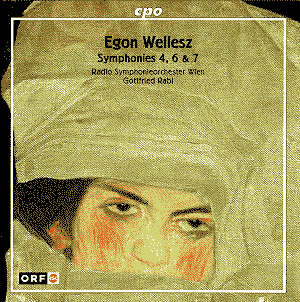In the thorny company of the Sixth and Seventh Symphonies
the Fourth declares its faith in its romantic roots. With a title
like Sinfonia Austriaca I was expecting something as epic in
scale as Furtwängler's Second Symphony, Karl Weigl's Fifth Symphony
The Apocalyptic or Franz Schmidt's Second. In fact the latter
is a close cousin with rustic charm meeting tortured massed violin writing
and cresting French horns. That simple charm also echoes through the
finale. Certainly Wellesz does not dabble in Mahlerianisms. The eloquent
confidence of the string anthem at 3.03 in the adagio impresses deeply.
The symphony was premiered on 11 November 1956 in Vienna conducted by
Rudolf Moralt who made a fine 1950s recording of the Schmidt Fourth
Symphony.
The other two symphonies are cut from uncompromisingly
dissonant material - not particularly extreme. The level of challenge
is similar to the symphonies of Benjamin Frankel though Wellesz is more
doom-laden and despairing. Havergal Brian might be another reference
point against which to measure these works. The level of discontinuity,
episodic progress is fairly high. if this is organic progress it is
deeply subsumed. In the middle movement of the Sixth (the last
five of Wellesz's nine symphonies are in three parts) Wellesz's hallmark
of articulating a theme by passing it note by note to different instruments
gives a feeling of mosaic. The themes themselves are not playful but
speak of the distraught, the impacted and the tragic. Moments of light
do occasionally float into sharp focus as in the rural caprice of 4.48
in the finale of the Sixth. These are moderated if not dispelled by
spasms and shudders of cold permeating the winter sunshine. In fact
the Sixth ends in quiet repose while the Seventh shouts in tragedy -
an angrily magnificent brass gesture. The Seventh is in much
the same determined, spasm-driven, mosaic mind-set as the Sixth. Wellesz
tumbled or propelled himself down an avant-garde slope to a far greater
degree than the likes of Karl Amadeus Hartmann. He is close to the style
of Humphrey Searle in his last three symphonies or to curdled late Frank
Bridge (Second Piano Trio, Phantasm and Oration). He is never dull or
prolix (look at the durations of the later two symphonies) and always
displays brilliance in instrumental texture. All the same many will
find this harder going and should be aware that Wellesz branched out
into restless waters from the 1960s onwards.
The two later symphonies were respectively premiered
on 23 June 1966 at Nüremberg with Michael Gielen conducting the
Bavarian Radio Symphony Orchestra and 21 November 1968 with Hugo Rignold
conducting the City of Birmingham Symphony Orchestra. Rignold (who recorded
grand versions of Bliss's Music for Strings and Meditations
on a Theme of John Blow for Lyrita in the mid-1960s with the CBSO)
championed most of the later symphonies on the BBC Third Programme.
Indeed many of us know these works from those very tapes.
The conductor's note about the recording process tells
us that Wellesz's printed scores and mss were littered with errors.
Time oppressed the elderly composer and a harvest of misprints and mistakes
was the result. Fortunately the conductor Gottfried Rabl was able to
examine sketches and galley proofs at the National Library in Vienna
and made all necessary corrections.
The notes, typically encyclopedic for CPO, are by Hannes
Heher.
Wellesz fled to England in the face of the Nazi insurgency
of the 1930s. It is encouraging to see his music taken up again by Viennese
forces. He is a serious and unsettling composer who merits a voice.
My understanding is that, longer term, CPO will record all nine Wellesz
symphonies.
Rob Barnett

